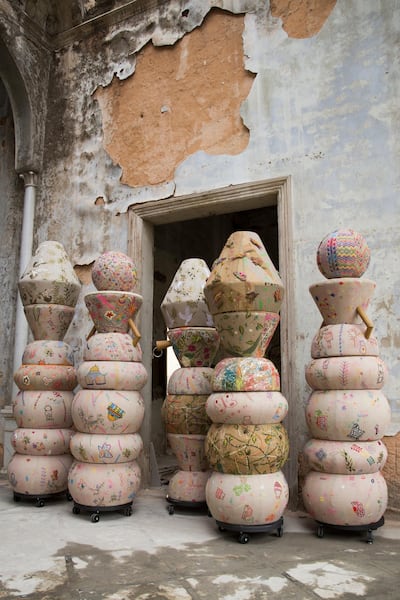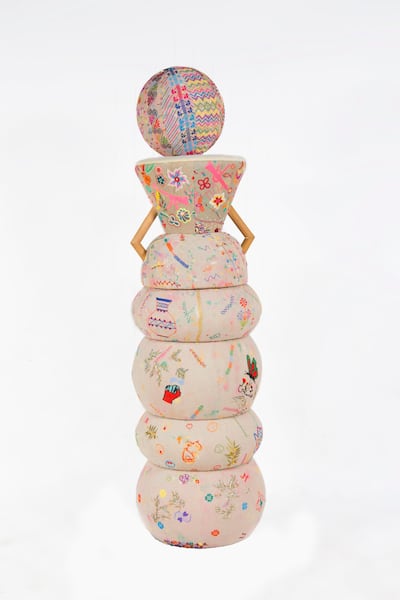It made perfect sense for the UAE social enterprise 81 Designs to collaborate with Lebanese furniture house Bokja.
Ever since 81 Designs was founded three years ago, by Lebanese-Palestinian mother-daughter team Nesrine El Tibi and Nadine Maalouf, its mandate has been to collaborate with artists from across the Arab world, to create art tempered with humanity and produced by women living in Palestinian refugee camps in the south of Lebanon. This way, the women put their imagination and skills to good use and receive a livelihood.
Beirut-based Bokja, on the other hand, was founded in 2000 by Lebanese friends Hoda Baroudi and Maria Hibri. The ladies rescue, transform and create joyous furniture pieces. What were once discarded antiques are repurposed through layers of vintage textiles, which are meant to mirror the many layers of Beirut. The end products are standalone pieces of artistic furniture that marry design aesthetics from the East and West.
Additionally, Bokja embarks on collaborations with artists and organisations such as 81 Designs, to deliver a message. Over the past 18 years, it has been involved in more than 20 partnerships and installations.
“It was only natural that when this project came along, and it involved women in the refugee camps, we would be on board. We are crying out for collaborations like this, something we seek, always,” say the Bokja duo.
For 81 Designs, this is their third art collection that features the Palestinian embroidery art of tatreez, carried out by refugee artisans. The debut collection reinterpreted works by acclaimed Tunisian artist eL Seed through embroidery, and last year’s collection had the women cross-stitch renditions of 14 pieces of pop art by renowned British-Moroccan artist Hassan Hajjaj.
“For our third, we just told the ladies of Bokja how eager we were to work with them, and they were just as excited as we were,” says El Tibi. “81 Designs is about three things: empowerment of women, making a difference in the community and mixing art with humanity.” In these goals, she says, the art houses are united. “We share the same passion, the same vision. They are passionate about female empowerment, and they have a love of textiles that translated perfectly to the women in the refugee camps, who deal with fabric and thread and textiles in their tireless work to create art from these materials, doing it all by hand.”
The idea for the project, to be unveiled at Abu Dhabi Art next month, began with paying tribute to the UAE's Founding Father in the Year of Zayed. Sheikh Zayed was renowned for his work towards empowering women and bettering their status in society, says El Tibi.
“It fit together, and because Bokja deals with textiles, it made sense to create 100 scarves or shawls, to mark the 100 years of Zayed.”
Hibri adds that they drew on Sheikh Zayed’s poetry for inspiration. “We are suckers for Arabic poetry, and we chose verses from a beautiful poem of Sheikh Zayed’s, a personality we admire greatly. We asked the refugee ladies to embroider these verses on the textiles, together with certain motifs that represent the UAE, such as Burj Khalifa, the oryx, palm trees, and more classical motifs to fit the design.”
The scarves will retail for about US$600 (Dh2,200).
“The second part is the Standing Tall sculptures,” says Bokja’s Baroudi. “We consider them sculptures, but they are and they aren’t. They can be deconstructed and interpreted in so many ways, but that’s where the fun started for us, because we asked the ladies of the camp to adopt a free rein in the design and in the stitching. It took them two months to finish the scarves and we expected it to take them just as much time. But now that they understood our approach to this work, to this art, and how free we are in our approach to design, how we felt everything goes and how we wanted to liberate them to transcend all their inhibitions and limitations, to understand there are no taboos, they blew us away.”
In two weeks, the 30 Palestinian women, from Ein Al Hilweh refugee camp in Saida, expressed their fears, dreams, anger, aspirations and hopes onto the textiles from Bokja, creating sculptures that represent them “standing tall” in the face of adversity.
The five totems mimic the female form and represent independence, empathy, compassion, nurturance and strength. Each sculpture will sell for $8,000 (Dh29,300). The stacked cylindrical cushioned seats are upholstered with textiles from around the world and hand-embroidered.
“Both Bokja and ourselves at 81 Designs believe in women standing tall,” explains El Tibi. “It’s what Sheikh Zayed always wanted as well. And our job is to help them [do so]. We started with just eight women three years ago, and now for this project, we had 30 women working at a time, and we’re so proud of that. We’re helping them provide for their families. When you look at the designs you become really emotional. Some of those designs on the scarves and the sculptures were created by the women themselves, they were their own designs, their own messages.”
Standing Talltakes place at Abu Dhabi Art, from November 14 to 17, at Manarat Al Saadiyat
______________________
Read more:
‘Solidarity’ and what it means in Palestine’s art scene
Art under occupation: Qalandiya International opens in Ramallah and Jerusalem
Inside Arthere: the space that’s building bridges between cultures



